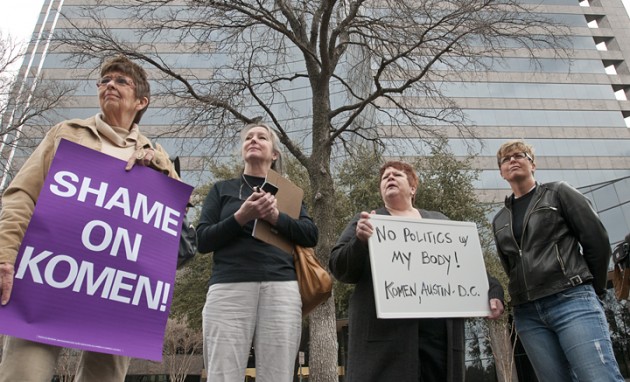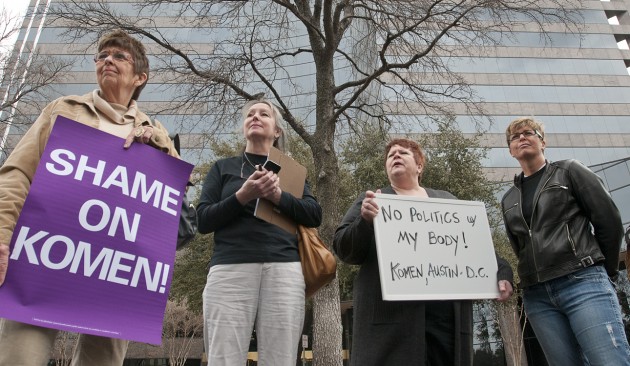
Associated Press
By Ray Henry
Associated Press
ATLANTA — A vice president at the Susan G. Komen for the Cure resigned Tuesday, saying the breast cancer charity should have stood by its politically explosive decision to cut off funding for Planned Parenthood.
Karen Handel, a Republican who opposed abortion as a candidate for Georgia governor, said she was actively engaged in efforts to cut off the grants and said the charity’s reversal hurt its core mission.
“I am deeply disappointed by the gross mischaracterizations of the strategy, its rationale, and my involvement in it,” Handel said in her letter.
“I openly acknowledge my role in the matter and continue to believe our decision was the best one for Komen’s future and the women we serve,” he said.
The grants, totaling $680,000 last year, went to breast-screening services offered by Planned Parenthood, which provides a range of women’s health care services including abortions. Under criteria developed by Komen during Handel’s tenure, Planned Parenthood would have been disqualified from future grants because it was under a congressional investigation launched at the urging of anti-abortion activists.
Komen, the nation’s largest breast-cancer charity, reversed course after its decision ignited a three-day firestorm of criticism. Members of Congress and Komen affiliates accused the group’s national leadership of bending to pressure from anti-abortion activists.
“Neither the decision nor the changes themselves were based on anyone’s political beliefs or ideology,” Handel said in her resignation letter. “Rather, both were based on Komen’s mission and how to better serve women, as well as a realization of the need to distance Komen from controversy.”
Handel said the discussion had started before she arrived at the organization last year. She said the charity was concerned that some Roman Catholic Dioceses had encouraged believers not to give to Komen because it supported Planned Parenthood.
“I was tasked with identifying options that would allow us to move to neutral ground about this so we weren’t on either side of you know, pro-life, pro-choice,” Handel said.
Komen Founder and CEO Nancy G. Brinker said she accepted Handel’s resignation and wished her well.
“We have made mistakes in how we have handled recent decisions and take full accountability for what has resulted, but we cannot take our eye off the ball when it comes to our mission,” Brinker said in a statement. “To do this effectively, we must learn from what we’ve done right, what we’ve done wrong and achieve our goal for the millions of women who rely on us.”
Planned Parenthood spokeswoman Andrea Hagelgans declined to comment.
Handel said the now-abandoned policy was fully vetted by the Komen organization. Its board did not raise any objections when it was presented with the proposed policy in November, Handel said.
The breast cancer charity cited a probe backed by anti-abortion groups and launched by Rep. Cliff Stearns, R-Fla., to determine if Planned Parenthood improperly spent public money on abortions. Planned Parenthood says taxpayer money is strictly separated.
Until Tuesday, Handel had publicly kept silent about her role in the dispute.
“What was a thoughtful and thoroughly reviewed decision – one that would have indeed enabled Komen to deliver even greater community impact – has unfortunately been turned into something about politics,” Handel said. “This is entirely untrue. This development should sadden us all greatly.”
A person with direct knowledge of decision-making at Komen’s headquarters in Dallas said last week that the grant-making criteria were adopted with the deliberate intention of targeting Planned Parenthood.
The criteria’s impact on Planned Parenthood and its status as the focus of government investigations were highlighted in a memo distributed to Komen affiliates in December.
According to the person, who spoke on condition of anonymity for fear of repercussions, a driving force behind the move was Handel, who was hired by Komen last year as vice president for public policy after losing a campaign for governor in Georgia.
Brinker, in an interview with MSNBC last week, said Handel “did not have anything to do with this decision.”
Handel ran for governor in 2010. She received an endorsement from former vice presidential candidate and Alaska Gov. Sarah Palin, but lost a primary runoff to former Georgia Rep. Nathan Deal, who won the general election.
Throughout the campaign, Deal accused Handel of being soft on abortion.
Deal repeatedly attacked Handel over a 2005 vote she took while serving on a metro Atlanta county commission to give more than $400,000 to Planned Parenthood, though not for abortion services. The Georgia affiliate of Planned Parenthood said the money went to a downtown clinic for services such as cervical cancer screenings, testing for sexually transmitted diseases and birth controls.
A longstanding law bans using federal money to pay for abortions except in cases of rape, incest or to protect the health of the mother.
Anti-abortion activists in Georgia praised Handel’s decision.
“I commend her for it,” said Daniel Becker, president of the Georgia Right to Life.



